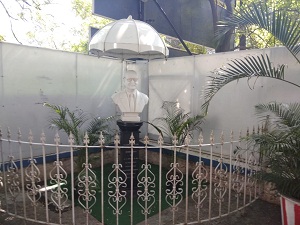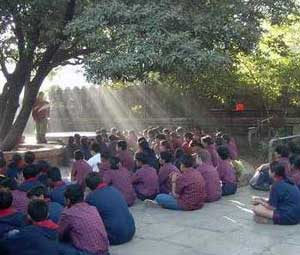R. B. Academy

The Rewachand Bhojwani Academy (RBA) is located in the city of Pune, Maharashtra, India. It is a mainstream school for children from the ages of 3 years to 18 years. The school is co-educational, with classes starting from the Nursery to Standard 12.
The students in Standard 10 have the option of appearing for the Maharashtra State Board, Secondary School Certificate (SSC) or the National Institute of Open Schooling Examination (NIOS). RBA is an integrated school welcoming children from different linguistic, religious and social backgrounds as well as children with diagnosed learning difficulties and physical challenges. Admission to any class is restricted to 35 children. Most classes have a waiting list for admission, seats becoming available only occasionally.
RBA has a total strength of 520 children and 65 staff members. It is recognized by the government of Maharashtra but does not receive government aid. Instruction for most subjects is through English. However, the study of Hindi and Marathi is compulsory. The academic year begins in mid June and ends in the end of April every year.
The school is located at 5, Staveley Road, Cantonment, Pune.
Our Philosophy

The Academy derives its inspiration from the past, present and future.
RBA's approach is eclectic, honouring the work, the ideas and innovations of educationists from the past. Therefore you will find here the influence of Vedanta, Tao, Gurukul, Froebel, Rousseau, Dewey, Aurobindo, Waldorf, Tagore, Gandhi and Krishnamurthy.
The Academy has no fixed "ideology" - only ideas that are evolving as we try them out, modify them. We adopt and adapt ideas to a rapidly changing society and constantly re-examine our work to see what "works". The effort is to be organic, holistic and dynamic. RBA has roots in both Eastern and Western culture and ethos. At the Academy one can see a synthesis of art, music, dance, theories, methods of teaching and attitudes to learning which are both oriental and occidental.
Since a school is traditionally defined as a "microcosm of society", we mirror the real world on a small scale. Any modern society comprises people of different races, cultural traditions, linguistic groups, ethnic and religious backgrounds. All societies have individuals of different abilities, talents, difficulties, disabilities and "handicaps".
All these kinds of people have a place at RBA.
Our objectives carefully balance the needs of the developing individual and the needs of an emerging society. Learning experiences are structured to engender sensitivity to the marginalised and disadvantaged. A gender balanced perspective - both feminist and masculinist is appropriate to an inclusive society.
The focus is on maximising human development potential. This includes the potential of children, teachers, administrators, and parents.
One thrust area is the development of an atmosphere of trust and respect so that individuals can risk making mistakes, learn to make choices, take decisions and face the consequences of their decisions. We encourage "and" thinking, as opposed to "or" thinking and promote the generation of multiple solutions to problems. This kind of learning is empowering, but calls for extensive divergent thinking as well as intensive soul searching.
We hold that learning should grow from and lead back to the learners' environment - both physical and social. We therefore keep our doors and windows open to allow outside realities into the school system.
This institution recognises the obvious interdependence between people, between people and the animal world, the environment and the cosmos. It fosters a sense of belongingness to each other, to the school, to the global society and to the earth. We trust that in appreciating the diversity of the universe, we will encourage a sense of responsibility and commitment to preserving this diversity.
RBA approaches include cooperative learning, project related work, community projects, business projects, internet based projects, etc., stress learning-by-doing and for application.
RBA is a process - a process of living, doing and being for all those involved including founders, funders, teachers who are learners and learners who are teachers, parents and others.
We celebrate life and its processes, and submit to its forces with respect.